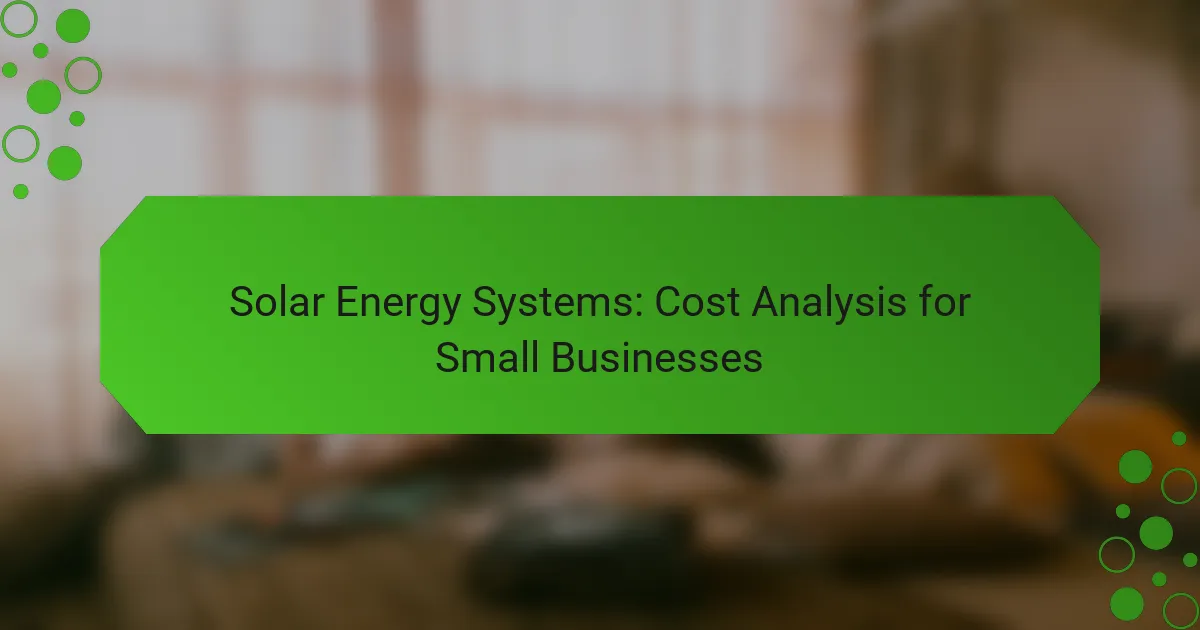Investing in solar energy systems can be a transformative decision for small businesses, offering both immediate and long-term financial benefits. While the initial costs may range in the tens of thousands, the potential for reduced energy bills and increased property value makes solar an attractive option. By understanding the various factors that influence these costs, business owners can make informed choices that align with their sustainability goals and financial strategies.
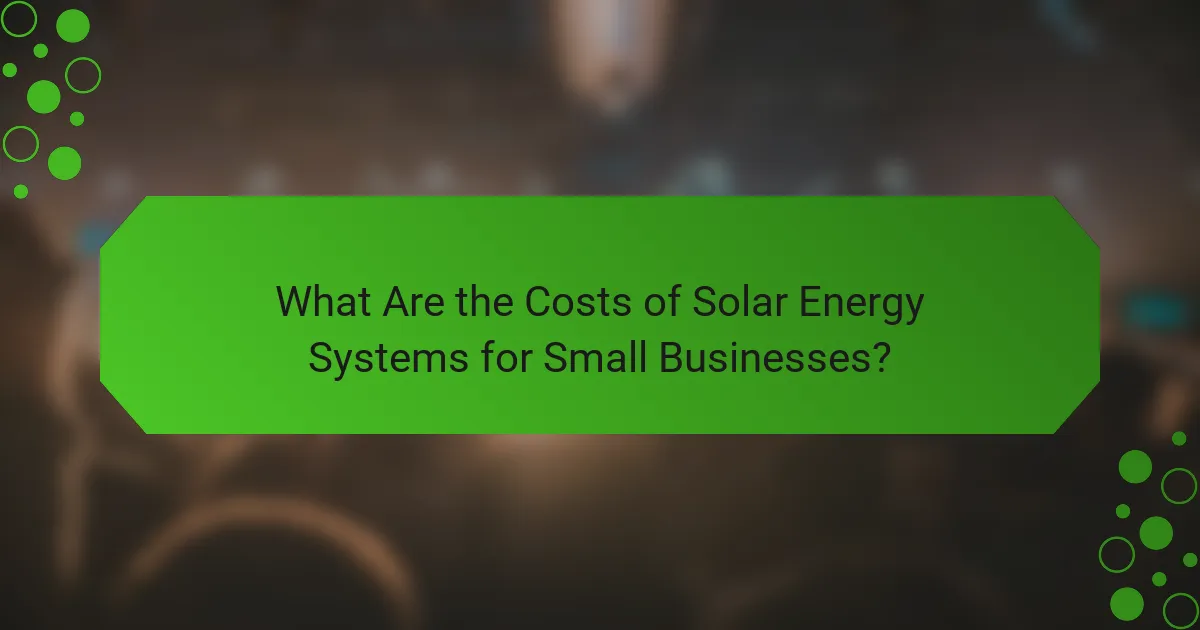
What Are the Costs of Solar Energy Systems for Small Businesses?
The costs of solar energy systems for small businesses can vary significantly based on factors such as system size, installation complexity, and location. Generally, businesses can expect to invest tens of thousands of dollars upfront, but this can lead to substantial long-term savings on energy bills.
Initial installation costs
Initial installation costs for solar energy systems typically range from $15,000 to $40,000, depending on the system size and specific requirements. This includes equipment, labor, and any necessary permits. Businesses should consider obtaining multiple quotes from installers to ensure competitive pricing.
Additionally, the type of solar panels and inverters chosen can impact overall costs. Higher efficiency panels may have a higher upfront cost but can provide better long-term savings.
Long-term savings
Long-term savings from solar energy systems can be significant, often reducing energy bills by 50% or more. Over the lifespan of the system, which can exceed 25 years, businesses may save hundreds of thousands of dollars on electricity costs.
Moreover, the savings can increase with rising utility rates, making solar an increasingly attractive option for small businesses looking to manage their energy expenses effectively.
Maintenance expenses
Maintenance expenses for solar energy systems are generally low, typically amounting to a few hundred dollars annually for cleaning and inspections. Regular maintenance ensures optimal performance and can extend the lifespan of the system.
It is advisable for businesses to monitor system performance and address any issues promptly to avoid costly repairs down the line.
Financing options
Small businesses have various financing options for solar energy systems, including cash purchases, loans, and leasing arrangements. Solar loans can help spread the cost over several years, making it more manageable.
Leasing allows businesses to use solar energy without the upfront costs, although this may limit some tax benefits. It’s essential to evaluate the total cost of ownership for each financing option to determine the best fit.
Tax incentives
Tax incentives can significantly reduce the effective cost of solar energy systems for small businesses. In the United States, the federal solar investment tax credit (ITC) allows businesses to deduct a substantial percentage of the installation costs from their federal taxes.
Additionally, many states offer their own incentives, such as rebates or tax credits, which can further enhance savings. Businesses should consult with a tax professional to understand the incentives available in their area and how to maximize them.
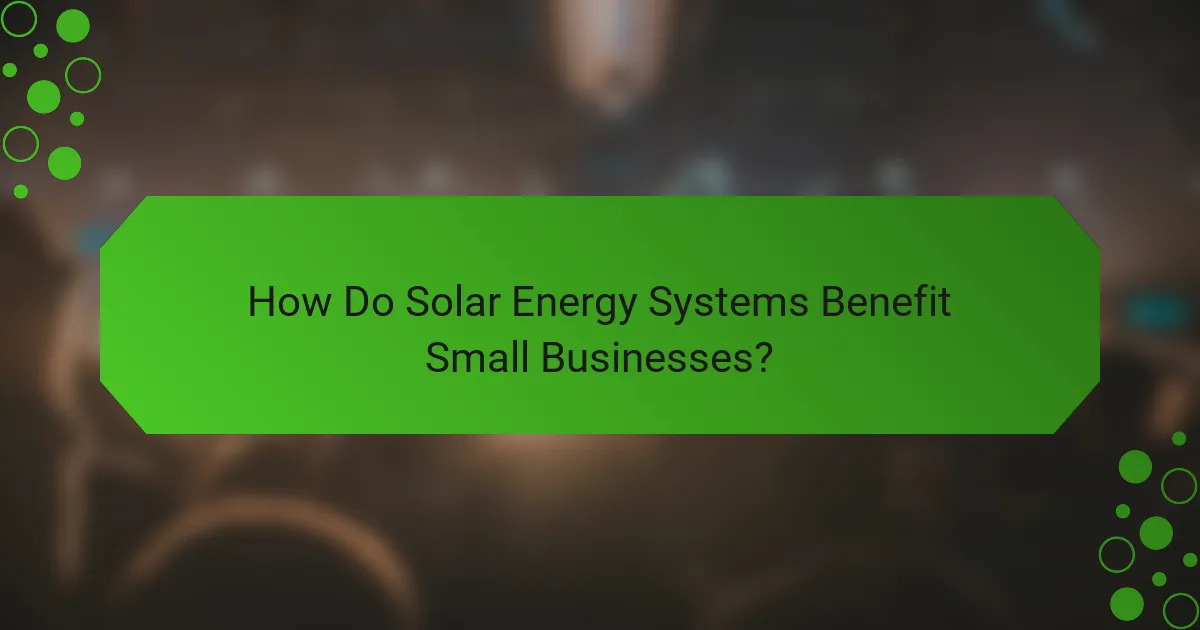
How Do Solar Energy Systems Benefit Small Businesses?
Solar energy systems provide significant advantages for small businesses, primarily through cost savings, increased property value, and positive environmental contributions. By harnessing solar power, businesses can reduce their energy expenses and enhance their market appeal while supporting sustainability efforts.
Reduced energy bills
One of the most immediate benefits of solar energy systems is the reduction in energy bills. By generating their own electricity, small businesses can significantly decrease their reliance on the grid, leading to savings that can range from 20% to 50% on monthly energy costs.
Additionally, many regions offer incentives such as tax credits or rebates that can further lower the initial investment in solar technology. It’s essential for businesses to evaluate local programs to maximize financial benefits.
Increased property value
Installing solar energy systems can enhance the property value of small businesses. Properties equipped with solar panels are often more attractive to potential buyers or renters, as they promise lower utility costs and a commitment to sustainability.
Studies suggest that homes and commercial properties with solar installations can see an increase in value ranging from 3% to 5%. This added value can be a crucial factor when considering long-term investments in real estate.
Environmental impact
Solar energy systems contribute positively to the environment by reducing greenhouse gas emissions. By switching to solar power, small businesses can play a part in combating climate change and promoting cleaner air.
Moreover, using renewable energy sources like solar can help businesses meet regulatory standards and corporate sustainability goals, which are increasingly important to consumers and investors alike. This commitment to environmental responsibility can enhance a business’s reputation and customer loyalty.
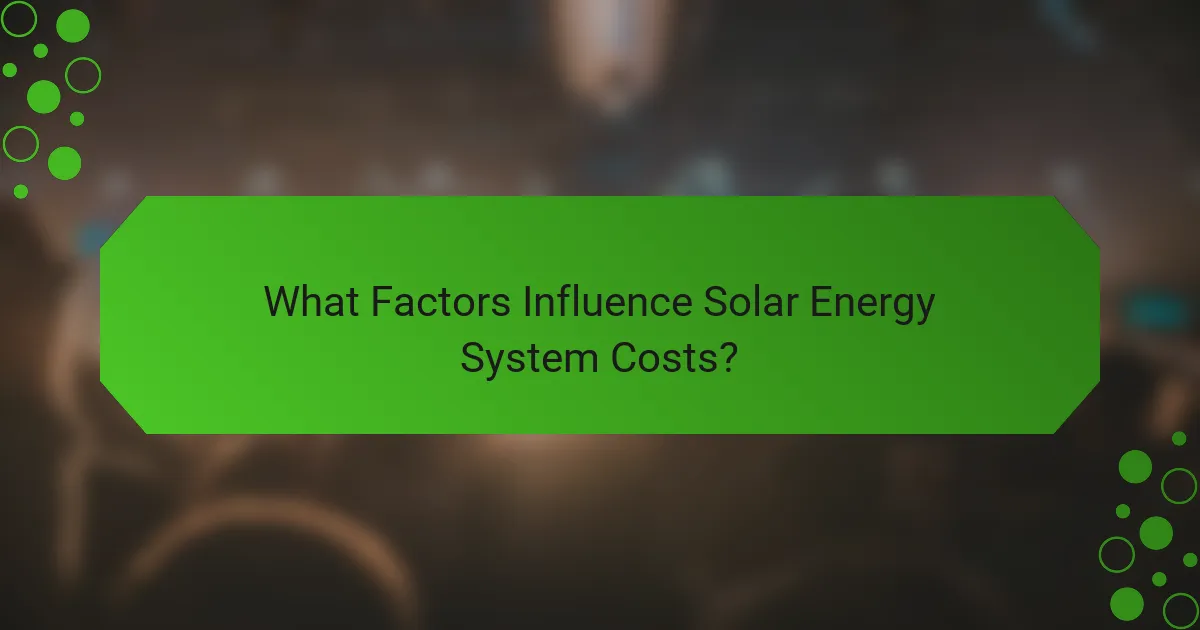
What Factors Influence Solar Energy System Costs?
Several key factors significantly affect the costs of solar energy systems for small businesses, including system size, location, installation complexity, and the type of solar technology used. Understanding these elements can help business owners make informed decisions and optimize their investments.
System size
The size of the solar energy system directly correlates with its cost. Larger systems typically require more solar panels and equipment, leading to higher initial expenses. However, they may offer better long-term savings through increased energy production.
When determining the appropriate system size, consider your business’s energy consumption patterns. Conduct an energy audit to estimate your needs, which can help you choose a system that balances cost and efficiency.
Location and installation complexity
Location plays a crucial role in solar energy system costs. Factors such as local solar incentives, sunlight availability, and regional regulations can influence pricing. Areas with abundant sunlight and supportive policies often have lower costs due to increased efficiency and available rebates.
Installation complexity also affects costs. If your business is in a location with challenging roof structures or limited access, installation may require additional labor and equipment, raising overall expenses. It’s essential to assess your site conditions before proceeding.
Type of solar technology
The type of solar technology selected can significantly impact costs. Common options include monocrystalline, polycrystalline, and thin-film solar panels, each with varying efficiencies and price points. Monocrystalline panels, for instance, tend to be more efficient but also more expensive compared to polycrystalline options.
Consider the trade-offs between cost and efficiency when selecting technology. While cheaper panels may reduce upfront costs, they might not provide the same long-term savings as higher-efficiency models. Evaluate your budget and energy goals to make the best choice for your business.
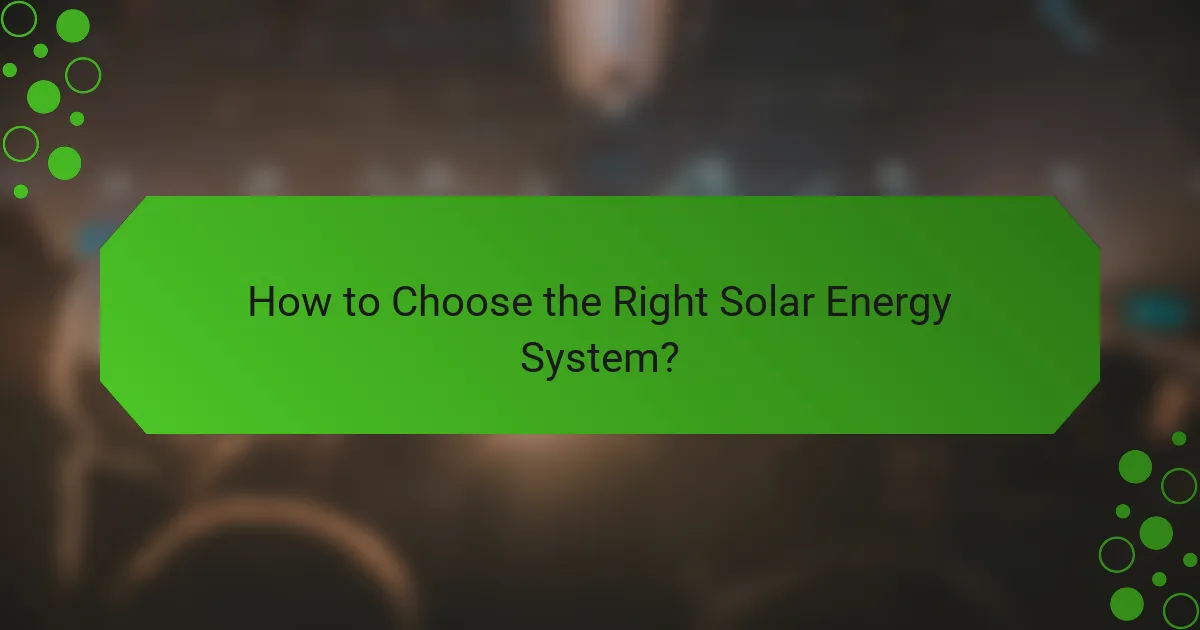
How to Choose the Right Solar Energy System?
Choosing the right solar energy system involves assessing your energy needs, evaluating financing options, and comparing solar providers. Each of these steps is crucial to ensure that you select a system that meets your business requirements and budget effectively.
Assessing energy needs
To assess your energy needs, start by reviewing your past electricity bills to determine your average consumption. Look for patterns in usage, such as peak hours and seasonal variations, as this will help you size your solar system appropriately.
Consider future growth as well; if you plan to expand your operations, factor in additional energy requirements. A common rule of thumb is to aim for a system that can cover at least 80-100% of your current and projected energy consumption.
Evaluating financing options
Financing options for solar energy systems vary widely and can significantly impact your overall costs. Consider purchasing outright, leasing, or entering a power purchase agreement (PPA). Each option has its advantages and disadvantages, such as upfront costs versus long-term savings.
In the U.S., federal tax credits can cover a substantial portion of installation costs, while some states offer additional incentives. Research local programs and financing options to find the best fit for your budget and cash flow situation.
Comparing solar providers
When comparing solar providers, look for companies with strong reputations, positive customer reviews, and experience in your area. Request quotes from multiple providers to understand the range of costs and services offered.
Pay attention to warranties, installation quality, and customer support. A good provider should offer at least a 25-year warranty on panels and a solid guarantee on installation. This ensures that you receive reliable service and support throughout the lifespan of your solar energy system.
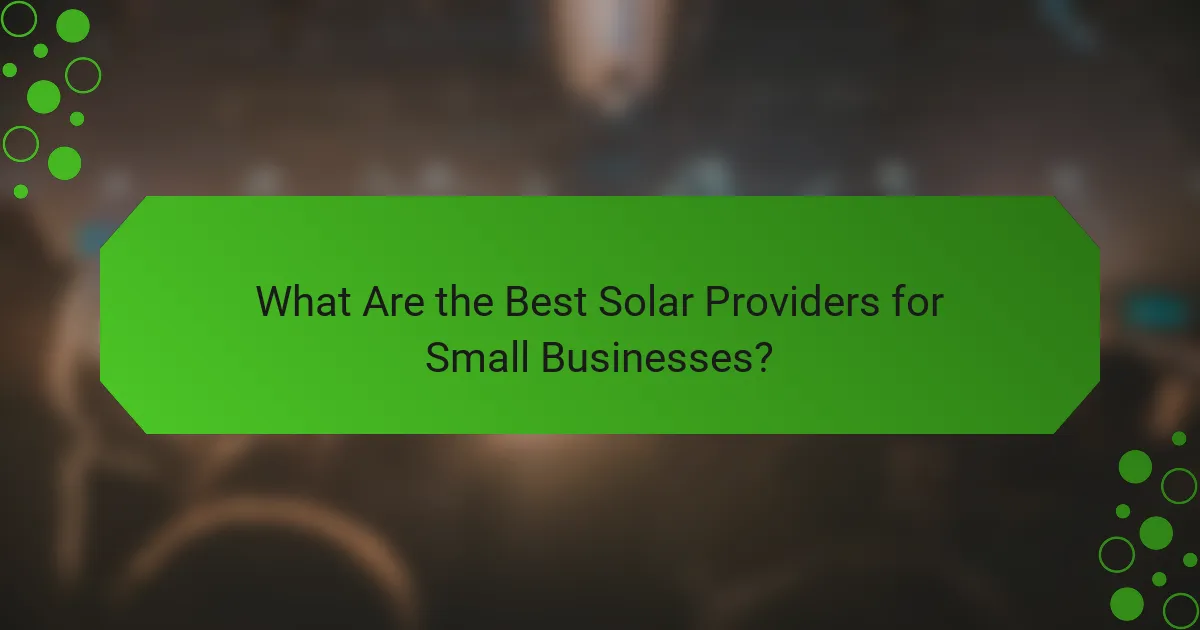
What Are the Best Solar Providers for Small Businesses?
Several solar providers cater specifically to small businesses, offering tailored solutions and competitive pricing. Key players in this market include SunPower, Vivint Solar, and ADT Solar, each with unique offerings that can meet different business needs.
SunPower
SunPower is known for its high-efficiency solar panels and comprehensive service offerings. They provide a range of financing options, including leases and power purchase agreements (PPAs), which can help small businesses manage upfront costs effectively.
One of the standout features of SunPower is its 25-year warranty, which covers both the panels and the installation. This long-term assurance can be a significant factor for businesses looking to invest in solar energy.
Vivint Solar
Vivint Solar offers flexible financing options, including cash purchases, loans, and leases, making it accessible for small businesses with varying budgets. Their installation process is streamlined, often completed within a few days, allowing businesses to start saving on energy costs quickly.
Additionally, Vivint Solar provides a monitoring system that allows business owners to track their energy production and savings in real-time, enhancing transparency and control over energy expenses.
ADT Solar
ADT Solar focuses on providing customized solar solutions with a strong emphasis on customer service. They offer free consultations to assess the specific energy needs of small businesses and recommend appropriate systems.
ADT Solar also provides a robust warranty and maintenance plan, ensuring that businesses can rely on their solar systems for years to come. Their competitive pricing and financing options make them a viable choice for small enterprises looking to transition to solar energy.
